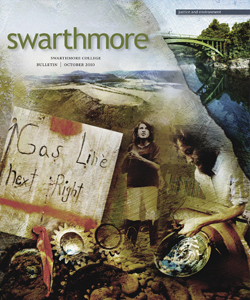Parlor Talk

In his essay “Justice, Technology, and the Environment,” scientist and religious scholar Ian Barbour ’44 asserts that our vision of the “good life” need not include a high-consumption lifestyle. Writing from a religious perspective, Barbour says that “once basic needs are met, true fulfillment is found in spiritual growth, personal relationships, and community life…. We should seek a level of sufficiency that is neither ever-growing consumption nor joyless asceticism.”
Although much of the developing world—and those still in poverty in industrialized nations—has not reached this level of sufficiency, consumption in wealthy nations continues to increase at a pace that not only threatens the environment but raises questions of social and economic justice all over the world. The ever-growing need for energy, combined with the increasing scarcity of easily tapped resources, has forced us into taking ever greater risks in the exploitation of oil, coal, and gas deposits.
The oil industry has figured out how to drill oil wells in mile-deep waters in the Gulf of Mexico. Coal companies are blasting the tops off mountains in Appalachia. And gas drillers are “fracking” shale deposits thousands of feet beneath Pennsylvania to release previously unexploited natural gas. It seems like the Earth is a ball in some giant industrial hand—a hand that has already extracted the easy energy and is now squeezing the ball harder and harder to get the last few drops.
So what is Swarthmore doing about it? The answer is “what we do best”—educating generations of scientists, engineers, politicians, and activists who care about the future. In “Rock and an Old Place”, you’ll see how last spring’s Environmental Studies capstone seminar did extensive research on the impact of gas drilling in the Marcellus Shale—and created an outstanding website to share what they had learned. And in “Activist on Coal River”, we meet Mathew Louis-Rosenberg ’05, who has dedicated his young life to stopping mountaintop removal mining and alleviating its effects on communities in West Virginia.
In the interconnected web of life on our planet, we are but small actors. We make decisions every day to consume resources that we now must wrest from the Earth in ways that may be profitable but are not sustainable. “Environmentalists have often neglected social justice, while social reformers have often neglected the environment,” writes Barbour, who believes that “the religious community can bring these values together in a distinctive way.”
So, in fact, can the academic community—especially at a liberal arts college, where the natural sciences, social sciences, and humanities can blend their knowledge and ideas in the service of justice and the environment.
A Note to Readers: In the July issue of the Bulletin, we announced a plan to save both money and paper by selectively binding two different editions—each containing about half of the Class Notes—to be sent only to the relevant classes. We heard from a number of alumni who objected to a generational split in Class Notes. Philosophically, we agreed that having all the Class Notes in each edition of the Bulletin makes an important statement about the wholeness of Swarthmore’s alumni body. Thus, we reconsidered the split-edition plan and explored other options. The result: This issue of the Bulletin is printed on a new stock that is significantly lighter and less expensive than our previous paper. It still carries Forest Stewardship Council approval as having been made responsibly from pulp grown in sustainable forests—a designation that is important to us and, we hope, to you.
 Email This Page
Email This Page